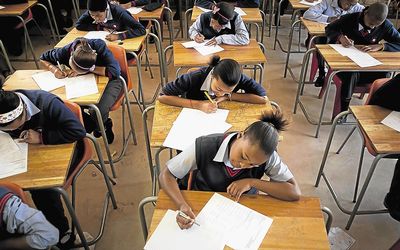SA is losing thousands of teachers annually, and most are headed to the United Kingdom.
Teachers battling to get by in SA are opting to relocate to the UK, Australia, Canada and other countries where they can earn better salaries, save money or make enough to pay off their debts, according to data by the Code4SA Data Journalism Academy.
And the exodus is showing no sign of slowing down.
While the trend illustrates the vast opportunities available for South African professionals beyond the country’s borders, it also underscores the difficulty that SA faces in retaining or attracting much-needed skills including engineering and mathematical skills.
An analysis of data from Organisation of Economic Co-operation and Development (OECD) countries shows that 17,752 South African teachers were working abroad last year in countries including the UK, Canada Australia and Portugal.
This is according to the latest available data, compiled in September last year.
The data records the migration of highly skilled and educated South Africans to all 34 OECD nations. Non-OECD member states are not included. Of these teachers working abroad, 10,988 were working in the UK, the highest figure of any OECD nation.
A teacher, who asked not to be named, says if he had a choice, he would have never emigrated. But, "underwhelming" work prospects and debt in SA drove him to seek work in the UK.
He did not want to be named as his visa application to leave the UK to work in Dubai is at a sensitive stage, and he feared that being named would jeopardise his chances of being granted the visa.
"I actually would never have left SA if it were not for my financial situation. But what I was earning was not nearly enough for me to live comfortably. I love my country and would not want to live anywhere else," he said.

The teacher, who has a BSc degree in physiology, says he applied to work abroad after hearing about a recruitment agency that was looking for teachers to work in the UK. He is now considering moving to Dubai, which is an increasingly popular destination for South African teachers wanting to work abroad.
A recruitment agency, SA Recruitment, claims to have successfully placed hundreds of teachers across the Middle East and Malaysia alone.
In SA, educationists are given adequate benefits as employees, the teacher says.
"The state used to provide two-thirds of cost for medical aid. Now, there is a fixed amount with a ceiling," he says.
"The housing subsidy also used to be a percentage of the cost and now it’s a fixed allowance of less than a thousand rand."
Research by the Homecoming Revolution, an organisation that assists South Africans wanting to return home, shows that 45% of people who left SA did so for career opportunities. The OECD data shows that teachers in Australia, the UK and the US earned some of the highest average incomes among OECD countries.
The migration of skilled professionals underscores a strife-ridden economy with dwindling prospects, even for the educated and skilled, according to some think-tanks.
Mienke Steytler, of the South African Institute of Race Relations, says this country’s lacklustre economic performance is driving the immigration of highly skilled professionals to countries with better work conditions, salaries and stronger currencies.
"The economy is unlikely to grow beyond 0% in 2016 and the expanded youth unemployment rate for 25-34 years of age is at 39.4%," Ms Steytler says.
"Young women are also most affected — of young women between the ages of 25 and 34, 45.2% are unemployed, compared to 34.4% of males.
"So, it is not surprising at all that young women in particular are leaving," she says.
Countries such as Australia, Canada, New Zealand and the UK favour highly skilled female migrants, she says.
These countries absorb about 75% of SA emigrants, according to the South African Institute of Professional Accountants.
Australia receives the greatest number of highly skilled migrants from SA, the OECD data show. SA is also losing more than 11,000 workers in other sectors, including mining, protection services, sales, building and extraction.






















Change: -0.47%
Change: -0.57%
Change: -1.76%
Change: -0.34%
Change: 0.02%
Data supplied by Profile Data
Change: -1.49%
Change: 0.08%
Change: -0.47%
Change: 0.00%
Change: -0.04%
Data supplied by Profile Data
Change: -0.27%
Change: -0.22%
Change: -0.23%
Change: -0.22%
Change: -0.23%
Data supplied by Profile Data
Change: -0.28%
Change: -1.15%
Change: -0.07%
Change: -1.21%
Change: -0.22%
Data supplied by Profile Data